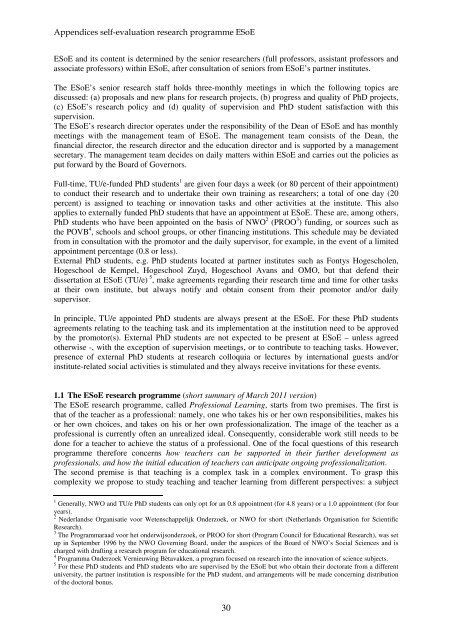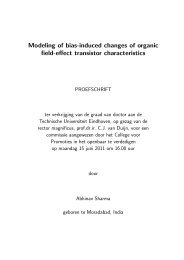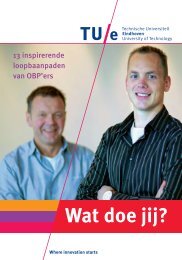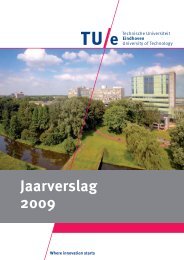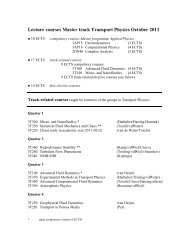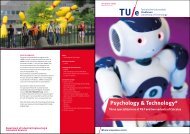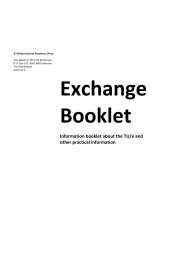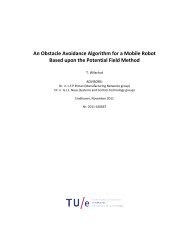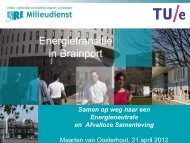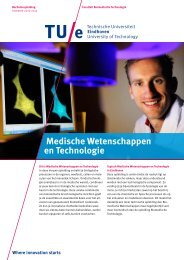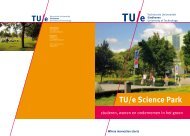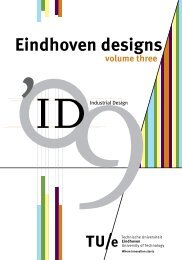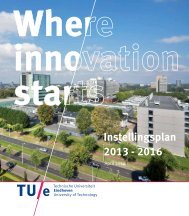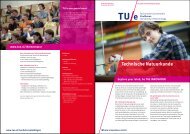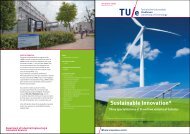Self-evaluation - Technische Universiteit Eindhoven
Self-evaluation - Technische Universiteit Eindhoven
Self-evaluation - Technische Universiteit Eindhoven
Create successful ePaper yourself
Turn your PDF publications into a flip-book with our unique Google optimized e-Paper software.
Appendices self-<strong>evaluation</strong> research programme ESoE<br />
ESoE and its content is determined by the senior researchers (full professors, assistant professors and<br />
associate professors) within ESoE, after consultation of seniors from ESoE’s partner institutes.<br />
The ESoE’s senior research staff holds three-monthly meetings in which the following topics are<br />
discussed: (a) proposals and new plans for research projects, (b) progress and quality of PhD projects,<br />
(c) ESoE’s research policy and (d) quality of supervision and PhD student satisfaction with this<br />
supervision.<br />
The ESoE’s research director operates under the responsibility of the Dean of ESoE and has monthly<br />
meetings with the management team of ESoE. The management team consists of the Dean, the<br />
financial director, the research director and the education director and is supported by a management<br />
secretary. The management team decides on daily matters within ESoE and carries out the policies as<br />
put forward by the Board of Governors.<br />
Full-time, TU/e-funded PhD students 1 are given four days a week (or 80 percent of their appointment)<br />
to conduct their research and to undertake their own training as researchers; a total of one day (20<br />
percent) is assigned to teaching or innovation tasks and other activities at the institute. This also<br />
applies to externally funded PhD students that have an appointment at ESoE. These are, among others,<br />
PhD students who have been appointed on the basis of NWO 2 (PROO 3 ) funding, or sources such as<br />
the POVB 4 , schools and school groups, or other financing institutions. This schedule may be deviated<br />
from in consultation with the promotor and the daily supervisor, for example, in the event of a limited<br />
appointment percentage (0.8 or less).<br />
External PhD students, e.g. PhD students located at partner institutes such as Fontys Hogescholen,<br />
Hogeschool de Kempel, Hogeschool Zuyd, Hogeschool Avans and OMO, but that defend their<br />
dissertation at ESoE (TU/e) 5 , make agreements regarding their research time and time for other tasks<br />
at their own institute, but always notify and obtain consent from their promotor and/or daily<br />
supervisor.<br />
In principle, TU/e appointed PhD students are always present at the ESoE. For these PhD students<br />
agreements relating to the teaching task and its implementation at the institution need to be approved<br />
by the promotor(s). External PhD students are not expected to be present at ESoE – unless agreed<br />
otherwise -, with the exception of supervision meetings, or to contribute to teaching tasks. However,<br />
presence of external PhD students at research colloquia or lectures by international guests and/or<br />
institute-related social activities is stimulated and they always receive invitations for these events.<br />
1.1 The ESoE research programme (short summary of March 2011 version)<br />
The ESoE research programme, called Professional Learning, starts from two premises. The first is<br />
that of the teacher as a professional: namely, one who takes his or her own responsibilities, makes his<br />
or her own choices, and takes on his or her own professionalization. The image of the teacher as a<br />
professional is currently often an unrealized ideal. Consequently, considerable work still needs to be<br />
done for a teacher to achieve the status of a professional. One of the focal questions of this research<br />
programme therefore concerns how teachers can be supported in their further development as<br />
professionals, and how the initial education of teachers can anticipate ongoing professionalization.<br />
The second premise is that teaching is a complex task in a complex environment. To grasp this<br />
complexity we propose to study teaching and teacher learning from different perspectives: a subject<br />
1 Generally, NWO and TU/e PhD students can only opt for an 0.8 appointment (for 4.8 years) or a 1.0 appointment (for four<br />
years).<br />
2 Nederlandse Organisatie voor Wetenschappelijk Onderzoek, or NWO for short (Netherlands Organisation for Scientific<br />
Research).<br />
3 The Programmaraad voor het onderwijsonderzoek, or PROO for short (Program Council for Educational Research), was set<br />
up in September 1996 by the NWO Governing Board, under the auspices of the Board of NWO’s Social Sciences and is<br />
charged with drafting a research program for educational research.<br />
4 Programma Onderzoek Vernieuwing Bètavakken, a program focused on research into the innovation of science subjects.<br />
5 For these PhD students and PhD students who are supervised by the ESoE but who obtain their doctorate from a different<br />
university, the partner institution is responsible for the PhD student, and arrangements will be made concerning distribution<br />
of the doctoral bonus.<br />
30


